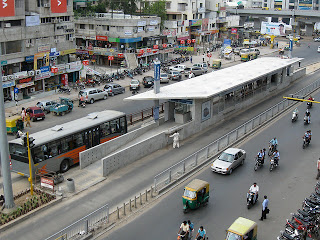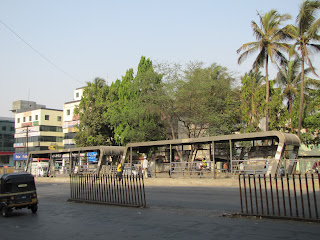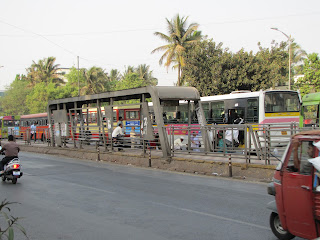Modern
Ahmedabad and Pune are quite comparable. Both cities have witnessed massive
growth in the past two decades. Ahmedabad
ranks 7th followed by Pune as the most populous cities in the country
respectively (Source: Metropolis report, pg 16. Link: http://www.metropolis.org/publications/indian-cities-managing-urba).
Both cities are characterized by the haphazard sprawl similar to other growing
metros in India. The sustained industrial boom in Gujarat has seen steady
growth of Ahmedabad over the past few decades. Pune is not very far behind and
has seen a construction boom over the past two decades as it has morphed into a
major commercial centre in Maharashtra after Mumbai.
A
recent survey by Times of India ranked Ahmedabad as the most livable city in
the country followed by Pune (All the cities ranked very low on the index.
Source: http://articles.timesofindia.indiatimes.com/2011-12-11/india/30504461_1_cities-ahmedabad-kolkata).
Thus as upcoming boom towns both are quite comparable. But this is now. A few
years down the line, Gujarat’s alpha city will take over Pune for more than one
reason. Two projects are changing the face of Ahmedabad. ‘Janmarg’, the
Ahmedabad BRTS and Sabarmati River Front Development Project.
‘Janmarg’
 |
Ahmedabad BRTS. Source: www.flickr.com Photo by Chris Kost
|
The
first phase of the BRTS is already up and running and is coveted as the first
successful BRT system in India. The planning and detailing from centralized
digital ticketing system, buses and station design is excellent. Designed by
CEPT, the work for next phases is already underway. When complete, BRTS project
will connect large parts of the city with efficient public transport. An added
layer of the proposed metro rail will further help enhance the connectivity within
the city.
The
first BRT system in India was in Pune and is now considered a
failure. In fact, Pune still has the larger approved length of BRT routes (112
kms) than Ahmedabad. As per this comment from ITDP (Institute for
Transportation and Development Policy), it is not even a real BRT since it does
not run in a closed loop and also it lacks same level boarding. Further, Pune
BRTS has failed to create a strong brand image to attract passengers. A
complete mismanagement led to closure of some routes.
Today, only two routes remain in operation. Next phases are only in files. Just imagine the transformation if all these routes were in operation by now. An affordable system of mass transit would have become available for the public. Usage and ownership of two wheelers would have automatically reduced, and with it would have gone down the petroleum demand and pollution. People, especially the old and children would have had better accessibility to various parts of the city. Puneites would have spent more time and money on visiting markets, temples, public spaces rather than wearing pollution masks and being stuck in traffic. This article written by transport specialists Abhijit Lokre and Madhav Pai, talk about the success story of Ahmedabad BRTS. It also highlights the need for strong management and political will. It’s time for Puneites to demand a resuscitation of the BRTS service for the city.
Today, only two routes remain in operation. Next phases are only in files. Just imagine the transformation if all these routes were in operation by now. An affordable system of mass transit would have become available for the public. Usage and ownership of two wheelers would have automatically reduced, and with it would have gone down the petroleum demand and pollution. People, especially the old and children would have had better accessibility to various parts of the city. Puneites would have spent more time and money on visiting markets, temples, public spaces rather than wearing pollution masks and being stuck in traffic. This article written by transport specialists Abhijit Lokre and Madhav Pai, talk about the success story of Ahmedabad BRTS. It also highlights the need for strong management and political will. It’s time for Puneites to demand a resuscitation of the BRTS service for the city.
 |
Broken lane barricades - Satara road, Pune
|
 |
BRT stations are in a bad shape
|
 |
Lack of same level boarding
|
Pictures taken near Lotus Court on Satara Rd.
by Pushkar Paradkar
No comments:
Post a Comment